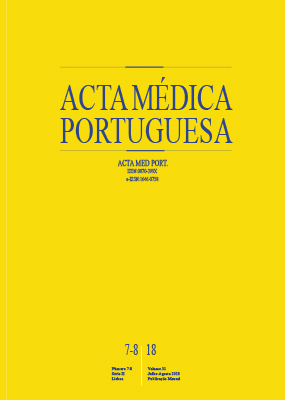Tradução e Validação do Questionário de Ativação do Doente (Patient Activation Measure) para Português, em Pessoas com Diabetes Mellitus Tipo 2
DOI:
https://doi.org/10.20344/amp.9072Palavras-chave:
Autocuidado, Diabetes Mellitus Tipo 2, Estudos de Validação, Inquéritos e Questionários, Participação do Doente, Portugal, Qualidade de Cuidados de Saúde, Satisfação do Doente, TraduçõesResumo
Introdução: A gestão da diabetes mellitus é, em grande parte, dependente da participação ativa dos doentes no processo de cuidados. O questionário de ativação do doente (Patient Activation Measure 13) avalia o conhecimento, capacidade técnica e confiança do doente nos auto-cuidados. Este estudo teve como objetivo a tradução, adaptação cultural e validação do questionário Patient Activation Measure 13 para português, em pessoas com diabetes tipo 2.
Material e Métodos: A tradução e adaptação cultural ocorreu em seis fases. O recrutamento decorreu nas salas de espera da Associação Protetora dos Diabéticos de Portugal, entre março e abril de 2014 (amostra de conveniência). O questionário foi auto-administrado; os valores de hemoglobina glicada foram obtidos a partir do processo clínico eletrónico. A análise psicométrica baseou-se no modelo de Rasch.
Resultados: A taxa de resposta foi de 76% e 193 indivíduos foram incluídos na análise psicométrica. A idade média dos participantes foi 67 (desvio padrão 10,1) anos, 42,7% eram mulheres, e a média do score do Patient Activation Measure (0 - 100) na amostra foi 58,5 (desvio padrão 10,1). A amostra apresentou níveis baixos a moderados de ativação. Todos os itens apresentaram bom ajuste e as categorias de resposta funcionaram adequadamente. A fiabilidade dos itens foi 0,97 e a fiabilidade das pessoas encontrou-se entre 0,77 (real) e 0,83 (modelo).
Discussão: O Patient Activation Measure 13 foi traduzido e adaptado culturalmente para português, bem como validado em pessoas com diabetes mellitus tipo 2, revelando boas propriedades psicométricas. Estudos futuros deverão avaliar a fiabilidade teste-reteste do Patient Activation Measure 13 Português e explorar a capacidade do mesmo em avaliar alterações na ativação ao longo do tempo.
Conclusão: O Patient Activation Measure 13 está agora disponível para utilização na população Portuguesa, apresentando boas propriedades psicométricas.
Downloads
Downloads
Publicado
Como Citar
Edição
Secção
Licença
Todos os artigos publicados na AMP são de acesso aberto e cumprem os requisitos das agências de financiamento ou instituições académicas. Relativamente à utilização por terceiros a AMP rege-se pelos termos da licença Creative Commons ‘Atribuição – Uso Não-Comercial – (CC-BY-NC)’.
É da responsabilidade do autor obter permissão para reproduzir figuras, tabelas, etc., de outras publicações. Após a aceitação de um artigo, os autores serão convidados a preencher uma “Declaração de Responsabilidade Autoral e Partilha de Direitos de Autor “(http://www.actamedicaportuguesa.com/info/AMP-NormasPublicacao.pdf) e a “Declaração de Potenciais Conflitos de Interesse” (http://www.icmje.org/conflicts-of-interest) do ICMJE. Será enviado um e-mail ao autor correspondente, confirmando a receção do manuscrito.
Após a publicação, os autores ficam autorizados a disponibilizar os seus artigos em repositórios das suas instituições de origem, desde que mencionem sempre onde foram publicados e de acordo com a licença Creative Commons









